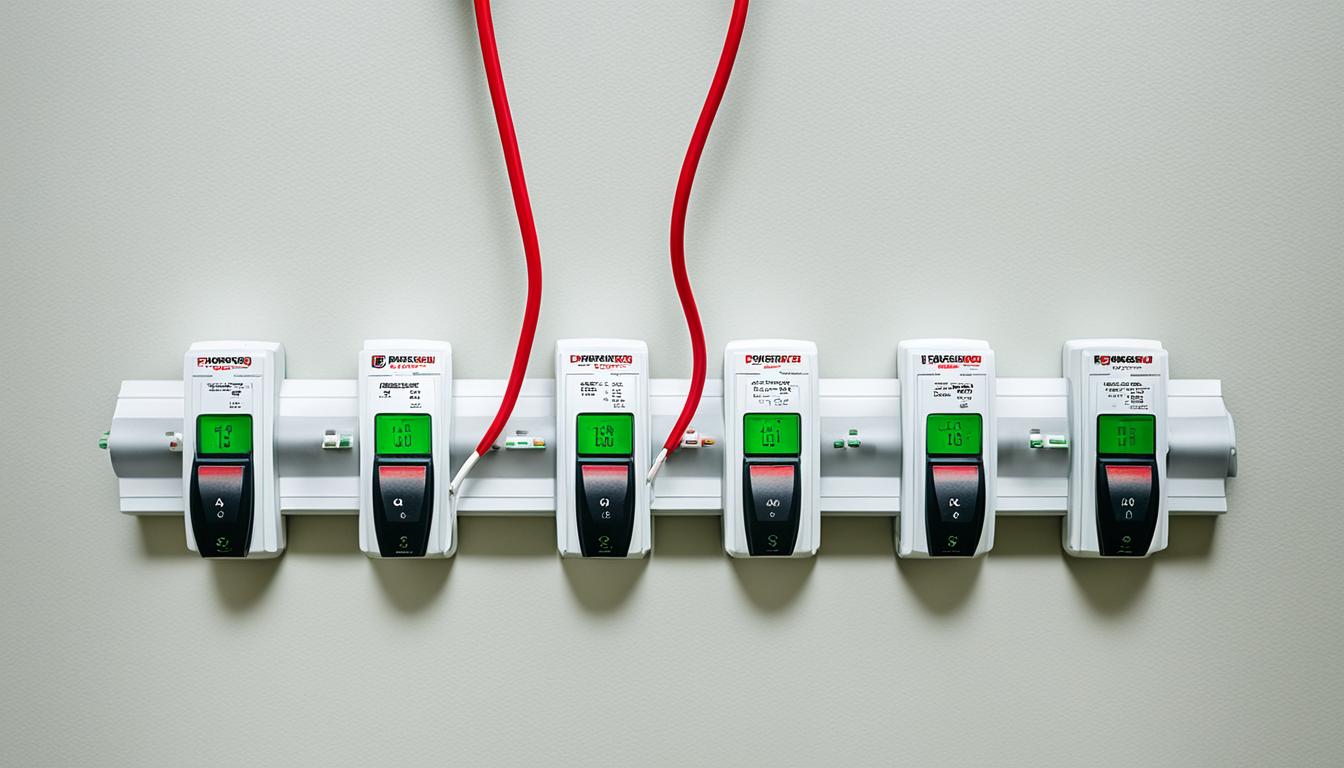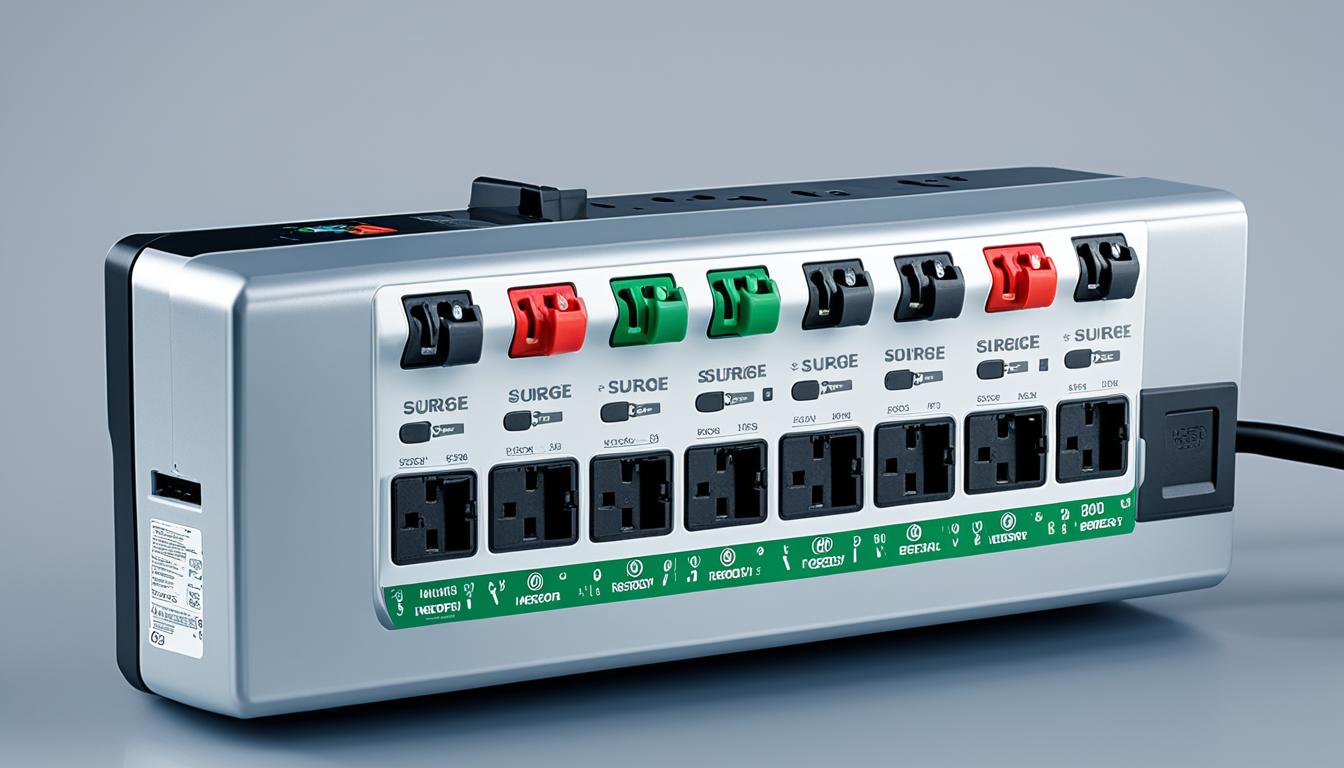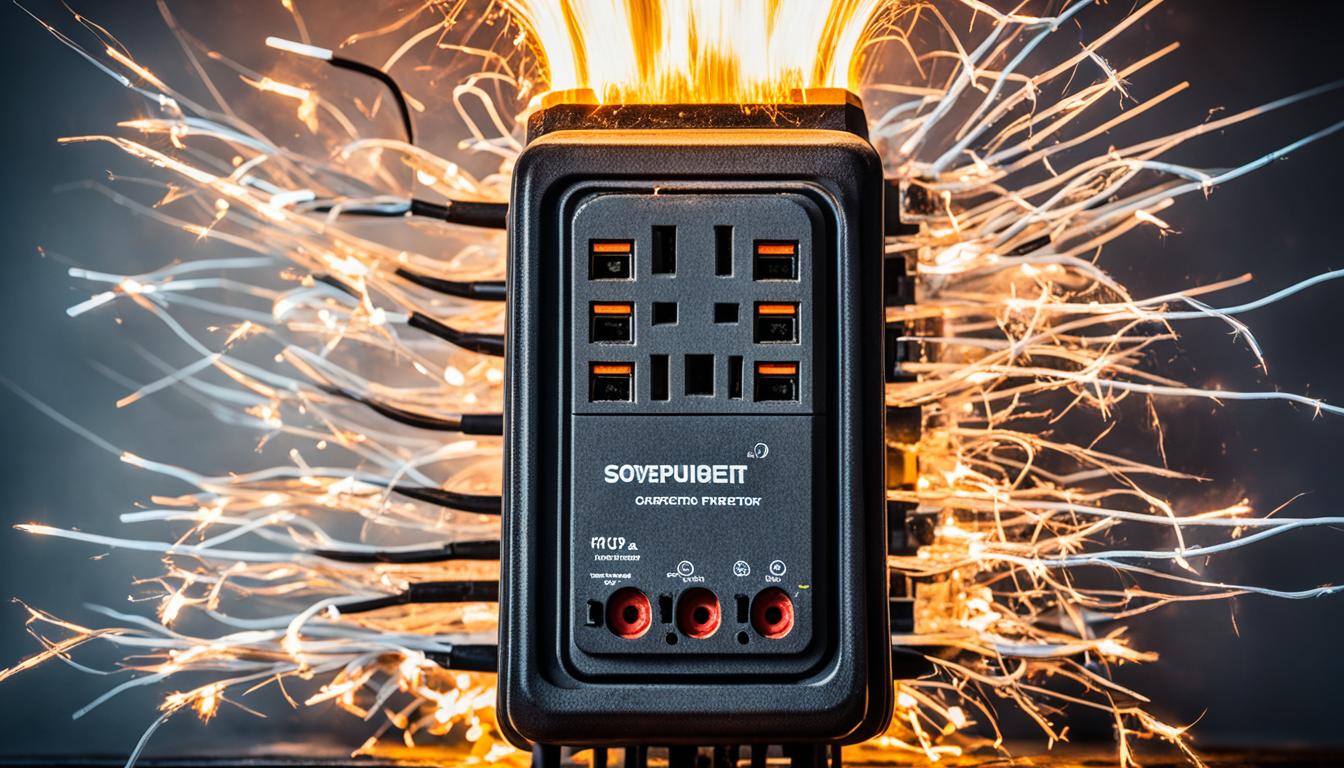Do you know the difference between an extension cord and a surge protector? Understanding the characteristics and uses of these two devices is essential for keeping your electronics safe. Let’s dive into the details and explore the contrasting features of extension cords and surge protectors.
Key Takeaways:
- Extension cords and surge protectors serve different purposes.
- Extension cords provide power solutions for devices located far away from electrical outlets.
- Surge protectors protect your electronics from power surges that could cause damage.
- Consider the safety and protection of your devices when choosing between extension cords and surge protectors.
- Extension cords are generally more affordable, while surge protectors offer better protection.
Extension Cords: Power and Length Solutions
Extension cords provide a practical solution for powering devices that are located far away from electrical outlets. They offer convenience and flexibility, allowing you to connect your appliances, tools, or electronics wherever they are needed. When choosing an extension cord, it’s important to consider factors such as wire type, grounding, and amperage to ensure safety and optimal performance.
Two-Wire Extension Cords
Two-wire extension cords are commonly used for basic household appliances and electronics. They consist of two conductors, typically a hot wire and a neutral wire, which enable electricity to flow to your devices. These cords do not have a grounding conductor, which means they should not be used with appliances or tools that require a ground connection for safety.
Three-Wire Extension Cords
For heavy-duty machinery or applications that involve extreme conditions, three-wire extension cords are recommended. These cords feature an additional grounding conductor, usually a bare wire or a green wire, which provides an extra layer of protection against electrical shocks. The grounding conductor diverts any excess electrical current to the ground, ensuring the safety of both the user and the connected devices.
Grounded Extension Cords
Grounded extension cords, also known as three-prong extension cords, are equipped with a three-pronged plug and a corresponding outlet. This third prong serves as the grounding conductor, providing a safe path for electrical currents in case of a fault or surge. Grounded extension cords offer enhanced safety and are suitable for use with appliances that require a grounding connection, such as computers, refrigerators, or power tools.
Ungrounded Extension Cords
Ungrounded extension cords, on the other hand, are designed for two-pronged or ungrounded electrical appliances. They lack the additional grounding conductor found in grounded extension cords, making them unsuitable for appliances that require grounding. It’s important to note that using an ungrounded extension cord with a grounded appliance or tool may compromise safety and increase the risk of electrical hazards.
Amperage of Extension Cords
Amperage, measured in amps, indicates the maximum current that an extension cord can safely handle. When choosing an extension cord, consider the amperage requirements of your devices and match them with a cord that can support the load. Higher amperage cords are suitable for heavy-duty equipment and longer distances, while lower amperage cords are suitable for smaller devices with lower power consumption.
Remember to always check the manufacturer’s guidelines and use extension cords properly to prevent overloading or overheating, which can lead to fire hazards. By selecting the appropriate extension cord for your specific needs and following safety precautions, you can ensure reliable power connections and protect your devices.
Surge Protectors: Protection against Power Surges
Surge protectors are essential devices designed to safeguard your valuable electronics from harmful power surges. Unlike extension cords, surge protectors are specifically engineered to block or divert excess electrical energy that can potentially damage your devices.
One of the key features of surge protectors is their ability to block or divert energy. They utilize special components called metal oxide varistors (MOVs) to effectively ground and divert electrical surges. When a power surge occurs, the MOVs absorb the excess voltage and direct it away from your devices, preventing potential damage.
Surge protectors are rated based on their ability to handle power surges. These ratings are an important factor to consider when choosing a surge protector. The rating is typically indicated in joules, which represent the amount of energy the surge protector can absorb before it reaches its limit. It’s crucial to select a surge protector with a sufficient joules rating to ensure adequate protection for your electronics.
Surge protectors with higher ratings offer better protection against power surges. However, it’s important to note that the higher the rating, the shorter the lifespan of the surge protector may be. This means that surge protectors with lower joules ratings might need to be replaced more frequently to maintain optimal protection.
To make it easier for consumers to understand the level of protection provided by a surge protector, they are usually labeled with specific ratings. These ratings can give you a clear indication of how effectively the surge protector can block or divert power surges before reaching its absorption limit.
Surge protectors also come with joules labels. These labels indicate the amount of energy the surge protector can absorb before it fails to provide protection. It’s important to choose a surge protector with a joules rating that matches the level of protection you require for your electronic devices.
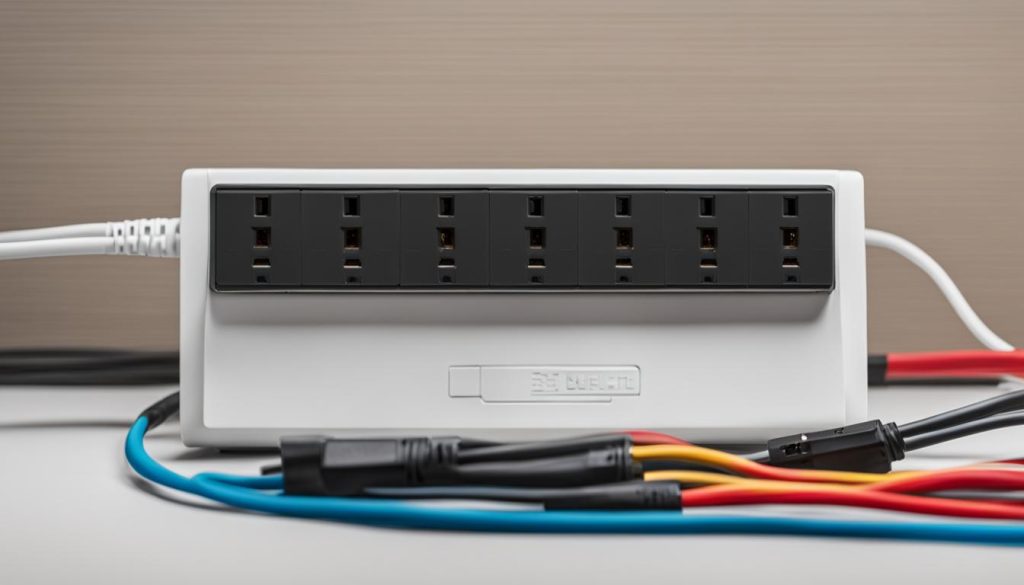
| Surge Protector Features | Benefits |
|---|---|
| Protects against power surges | Safeguards your electronics from damage caused by sudden voltage spikes |
| Blocks or diverts excess energy | Utilizes metal oxide varistors to ground and divert electrical surges away from your devices |
| Surge protector ratings | Indicates the level of protection the surge protector offers |
| Joules rating | Indicates the amount of energy the surge protector can absorb before failing |
Comparison: Extension Cords vs Surge Protectors
When it comes to powering your devices and protecting them from electrical surges, it’s important to understand the key differences between extension cords and surge protectors. Let’s compare these two options to help you make an informed decision.
Price Range
When considering the price range, extension cords generally come at a more affordable price point compared to surge protectors. Depending on the type and size, extension cords can range from as low as $1 to around $250.
In contrast, surge protectors have a slightly higher price range due to their built-in surge protection features. You can expect to find surge protectors priced between $3 and $1,200, with variations based on the level of surge protection and additional features.
Functionality and Features
Extension cords primarily provide a convenient power extension solution, allowing you to connect devices that are situated far away from electrical outlets. They come in different types, such as two-wire and three-wire cords, providing versatility for various applications.
On the other hand, surge protectors not only extend the reach of power but also offer protection against power surges. They are designed to redirect excess electrical energy away from your devices, safeguarding them from potential damage. Surge protectors utilize advanced technologies like metal oxide varistors to absorb and divert electrical surges.
“Choosing between extension cords and surge protectors boils down to your specific needs and priorities.”
While extension cords simply provide power extension, surge protectors offer added peace of mind by protecting your valuable devices. The decision depends on whether you require a basic power extension or need the added protection from power surges.
Overall, it’s crucial to consider not only the price but also the value of your devices and the importance of safeguarding them. Investing in a surge protector can provide long-term protection for your electronic equipment, potentially saving you from costly repairs or replacements in the event of a power surge.
Keep in mind that both extension cords and surge protectors should be used in accordance with safety guidelines and manufacturer instructions to ensure optimal performance and minimize any risks.
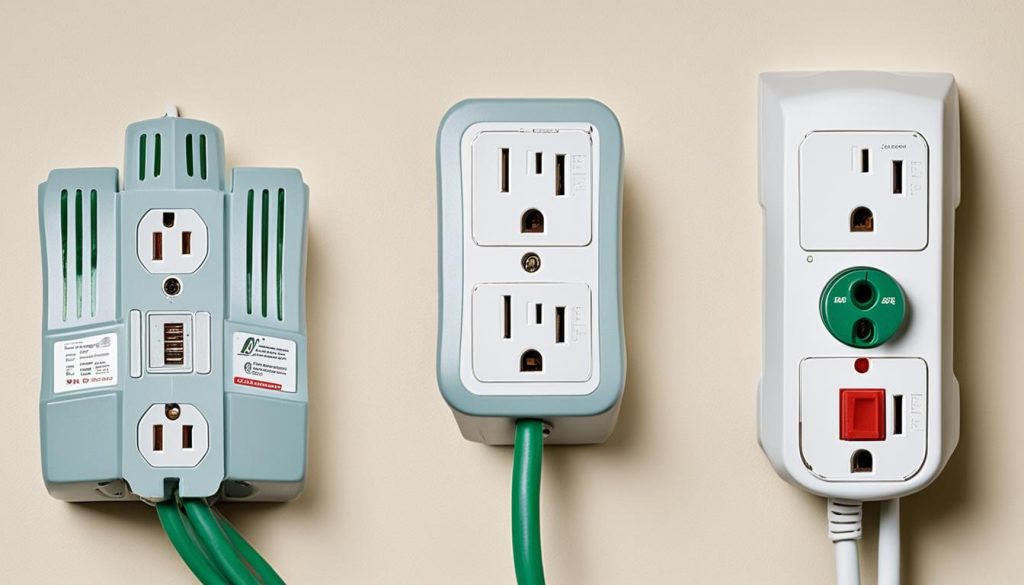
Importance of Surge Protectors and Proper Usage
Surge protectors are an essential component of your home or office electrical setup. They are designed to safeguard your valuable devices from power surges and voltage fluctuations, which can cause irreparable damage. Plugging devices such as computers, flat-screen televisions, and stereo systems into surge protectors provides an extra layer of protection, giving you peace of mind.
It’s important to note that surge protectors have a limited lifespan. They may wear out over time, even if there are no visible signs of damage. It is recommended to replace surge protectors periodically, especially after experiencing a significant power surge. By doing so, you ensure that your devices remain protected effectively.
One of the conveniences of modern surge protectors is the inclusion of USB connections. Many surge protectors come equipped with USB ports, allowing you to charge your mobile devices directly from the surge protector. This eliminates the need for additional wall chargers, decluttering your space and providing a convenient charging solution.
When purchasing a surge protector, it is essential to review the warranty offered by the manufacturer. Some surge protectors come with warranties for the devices connected to them. This means that if your device gets damaged due to a power surge while properly connected to the surge protector, you may be eligible for a replacement or repair. Be sure to carefully read and understand the terms and conditions of the warranty to make the most of this added protection.
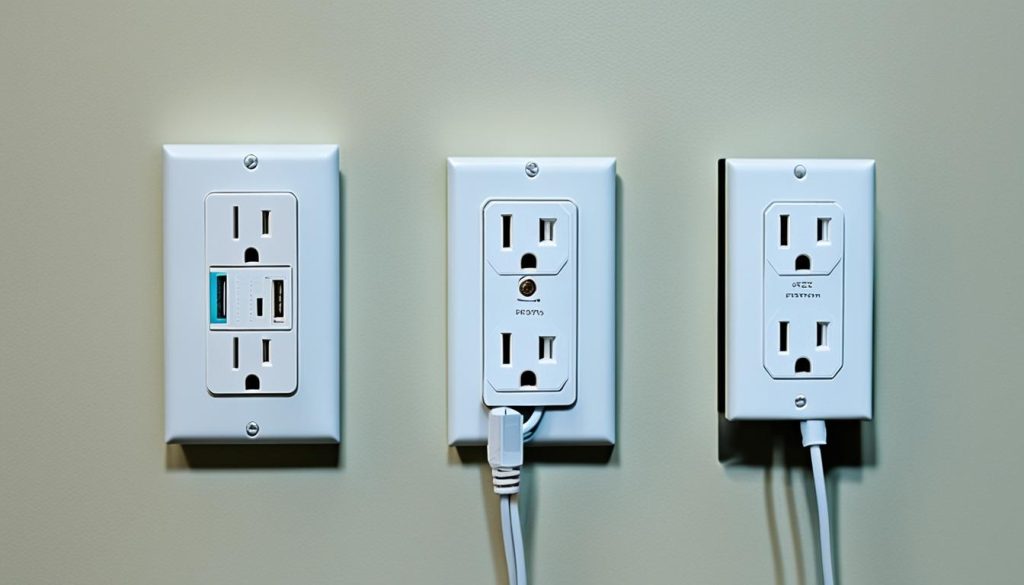
Key Points:
- Surge protectors are crucial for protecting your devices from power surges and voltage fluctuations.
- Devices such as computers, flat-screen televisions, and stereo systems should be plugged into surge protectors for added protection.
- Surge protectors have a finite lifespan and should be replaced periodically.
- USB connections on surge protectors offer convenient charging options for mobile devices.
- Review the warranty provided by the surge protector manufacturer to understand the coverage for connected devices.
| Device | Importance of Surge Protector |
|---|---|
| Computer | Protects sensitive components from power surges, preventing data loss and hardware damage. |
| Flat-screen Television | Ensures a stable power supply to prevent potential damage to the display and internal circuitry. |
| Stereo System | Preserves the audio quality and protects amplifier and speaker components from power surges. |
Choosing the Right Option for Your Needs
When it comes to protecting your devices and extending their power range, you have several options to consider. Depending on your specific needs, you may find that surge protector alternatives like the EVVR Energy Monitoring Smart Plug and Relay are the perfect fit. This innovative solution offers both power extension and surge protection, giving you peace of mind and convenience.
If you’re in search of a reliable and versatile extension cord, look no further than the GE 6-Foot Extension Cord. This durable cord offers the perfect blend of functionality and safety, allowing you to connect your devices further away from the power source without compromising on security.
For those who require multiple outlets and surge protection, the Anker Power Port Strip is an excellent choice. With its built-in surge protector, you can confidently plug in multiple devices and safeguard them against power surges. This power strip also offers convenient USB charging ports, ensuring that your mobile devices stay powered up.
Assessing your specific requirements is vital when choosing between surge protector alternatives, extension cords, and power strips. Prioritize the safety and protection of your devices by selecting the option that best meets your needs. Whether it’s the EVVR Energy Monitoring Smart Plug and Relay, the GE 6-Foot Extension Cord, or the Anker Power Port Strip, make the right choice to keep your devices powered and secure.
FAQ
What is the difference between an extension cord and a surge protector?
Extension cords provide power solutions for devices that are far away from electrical outlets, while surge protectors are designed to divert or block excess power surges that can damage your electronics.
When should I use an extension cord?
Extension cords are used when you need to provide power to devices that are far away from electrical outlets.
When should I use a surge protector?
Surge protectors should be used to protect your expensive devices, such as computers and televisions, from power surges.
Are extension cords safe to use?
Extension cords can be safe to use if used properly and for their intended purpose. However, it’s important to follow safety guidelines and not overload the cord.
Are surge protectors safe to use?
Surge protectors are safe to use and play a crucial role in protecting your devices from power surges. However, it’s important to replace them after a serious power spike or after their recommended lifespan.
How do surge protectors work?
Surge protectors use metal oxide varistors to ground and divert electrical surges, protecting your devices from potential damage.
What is the importance of surge protectors?
Surge protectors are important for protecting your expensive devices from power surges and ensuring their longevity.
What devices should I plug into a surge protector?
Devices such as computers, televisions, and stereo systems should be plugged into surge protectors to provide extra protection.
How long do surge protectors last?
Surge protectors can wear out over time, even if there are no visible warnings. It’s recommended to replace surge protectors after experiencing a serious power spike or following their recommended lifespan.
Do surge protectors come with warranties?
Some surge protectors offer warranties for the devices connected to them. It’s important to review the terms and conditions of the warranty before purchasing a surge protector.
How do I choose the right option for my needs?
It ultimately depends on your specific needs. If you require both power extension and surge protection, alternatives like the EVVR Energy Monitoring Smart Plug and Relay can be a suitable option. For those seeking a reliable extension cord, the GE 6-Foot Extension Cord offers convenience and safety. If a power strip with surge protection is the preferred choice, the Anker Power Port Strip provides excellent surge protection and multiple outlets for convenience.
